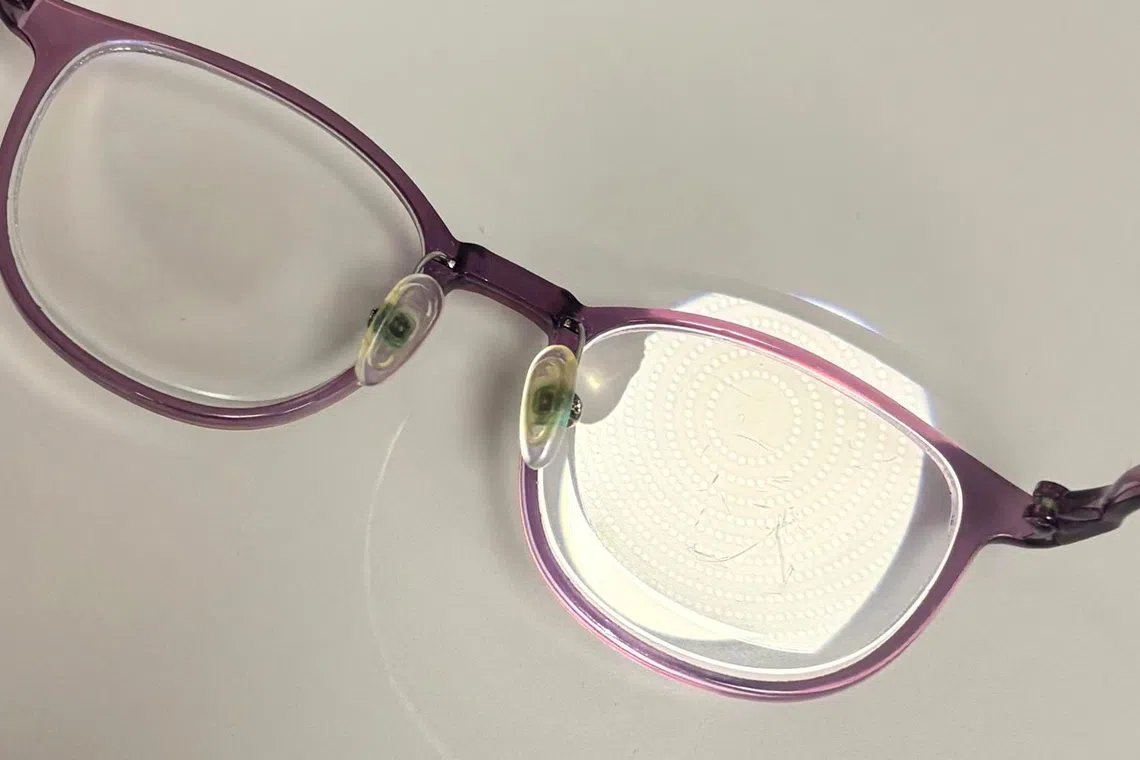Watchdog issues warning after kids given ordinary lenses for myopia treatment
Sign up now: Get ST's newsletters delivered to your inbox

Children with high myopia face an increased risk of eye diseases such as cataracts and glaucoma in adulthood.
PHOTO: SNEC MYOPIA CENTRE
- Some practitioners provided ordinary lenses instead of special myopia control spectacles for children, potentially causing long-term harm.
- The Optometrists and Opticians Board issued a warning, deeming product substitution unprofessional and threatening disciplinary action.
- Experts advise at least two hours of daily outdoor time, special spectacles, and reducing screen time to manage myopia effectively.
AI generated
SINGAPORE – Children who required special spectacles to slow down their myopia progression were found to have been given ordinary lenses, putting them at risk of possible long-term complications.
After learning about the misconduct, the Optometrists and Opticians Board on Aug 12 issued a warning to its approximately 2,800 registered practitioners.
“The board takes a serious view of this matter as it undermines the public’s trust in the profession, and compromises myopia management plans, particularly crucial for young children,” it said, adding that it would not hesitate to take disciplinary action.
Practitioners should prescribe only clinically proven speciality myopia-control optical products, it added.
The board highlighted that product substitution unknown to the patient constitutes unprofessional conduct and may lead to patient harm.
If prescribed speciality products are unavailable or deemed unsuitable, optometrists and opticians must discuss appropriate alternatives with the prescribing doctor and the patient.
Optometrists and opticians may also refer the patient to other providers who carry the prescribed product, the board said.
A spokeswoman for the board said it has received feedback on the misconduct from optometrists and opticians, but no formal complaints have been made. She declined to provide details, including whether specific retail chains or practitioners were involved.
The 12-member board, which governs the registration and regulation of optometrists and opticians in Singapore, is chaired by Adjunct Professor Lim Tock Han, group chairman of the medical board at NHG Health.
Under the Optometrists and Opticians Act, the board is empowered to impose sanctions including a fine or the cancellation or suspension of errant practitioners’ registration.
Based on information on its website that dates back to 2011, the board has not sanctioned any practitioners.
Myopia, or short-sightedness, is a condition of the eye that makes faraway objects appear blurry. To slow down the elongation of the eyeballs that worsens short-sightedness, children can be prescribed specially designed eyeglasses.
While these special lenses look like any other optical product at first glance, a closer inspection would reveal ring or honeycomb designs on the lenses.
Dr Foo Li Lian, clinical director of myopia service at the Singapore National Eye Centre, said the progression of myopia is irreversible once the eyeball elongates.
“Thus, timely and appropriate intervention for childhood myopia is critical,” she said.
Dr Janice Lam, a consultant at the ophthalmology department of the National University Hospital, warned that the consequences of high myopia can be severe.
“Children with high myopia face an increased risk of eye diseases in adulthood, including myopic macular degeneration, retinal detachment, cataracts and glaucoma, which can lead to vision impairment,” said Dr Lam.
Reducing myopia can lower the risk of a child developing these conditions, she added.
She said that clinical studies have shown that at least two types of myopia-control lenses – Halt (Highly Aspherical Lenslet Target) or Dims (Defocus Incorporated Multiple Segments) – can retard myopia progression by at least 50 per cent.
Over a two-year study period, a child using single vision lenses that only correct the vision but do not delay myopia progression would, on average, see a deterioration of 146 myopic degrees. For those using Halt lenses, the deterioration was less severe, at 66 myopic degrees.
There are also newer studies investigating whether the use of myopia-control lenses can prevent the onset of myopia in pre-myopic children.
Dr Lam said that having at least two hours of outdoor time daily, optical corrections through the special spectacles and low-dose atropine eyedrops delaying the onset and progression of myopia
Reducing screen time and taking regular breaks from reading can also help manage myopia.
“For every 20 minutes of near work, have your child look at something 20 feet (6m) away for at least 20 seconds or more,” said Dr Lam.


